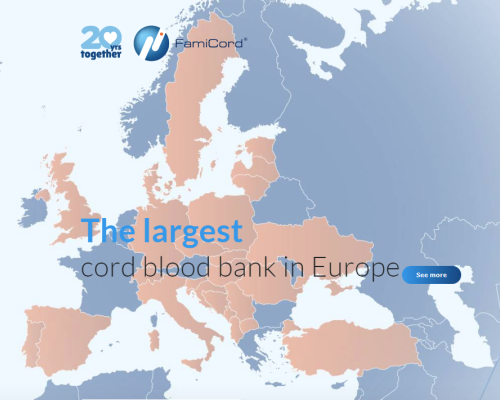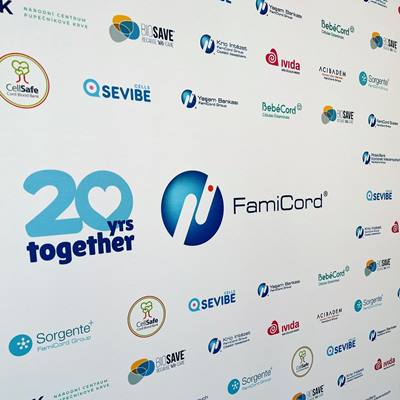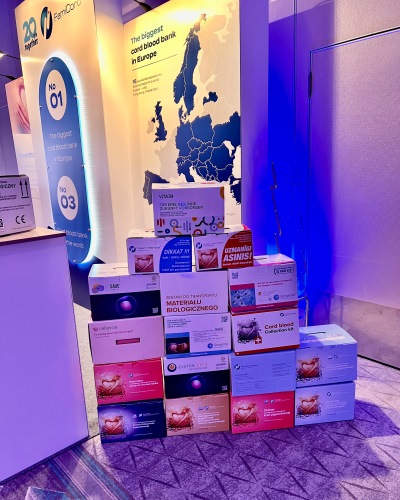Usted está aquí
The story behind FamiCord becoming the largest cord blood bank in Europe
 Cord blood banking in Europe is 25 years old. In 1997, the first family cord blood bank was established – it was Vita 34 in Leipzig, Germany. Soon after that, other banks appeared on the map. In 2002 in Warsaw, Poland, the Polish Stem Cell Bank (aka PBKM) was founded. That bank later expanded into other countries in Europe, forming FamiCord Group, which became #1 in Europe in terms of inventory. In 2021 FamiCord and Vita 34 merged and now that new player is dominating the European landscape with cord blood or cord tissue stored for more than 860 thousand families. This year in 2022, FamiCord/Vita 34 Group are celebrating their anniversaries. This article is about the development, current challenges, and future outlook of the FamiCord Group and the cord blood banking market in Europe. Parent’s Guide to Cord Blood Foundation interviewed Tomasz Baran, MD MBA, who is the Chief Commercial Officer at the combined entity.
Cord blood banking in Europe is 25 years old. In 1997, the first family cord blood bank was established – it was Vita 34 in Leipzig, Germany. Soon after that, other banks appeared on the map. In 2002 in Warsaw, Poland, the Polish Stem Cell Bank (aka PBKM) was founded. That bank later expanded into other countries in Europe, forming FamiCord Group, which became #1 in Europe in terms of inventory. In 2021 FamiCord and Vita 34 merged and now that new player is dominating the European landscape with cord blood or cord tissue stored for more than 860 thousand families. This year in 2022, FamiCord/Vita 34 Group are celebrating their anniversaries. This article is about the development, current challenges, and future outlook of the FamiCord Group and the cord blood banking market in Europe. Parent’s Guide to Cord Blood Foundation interviewed Tomasz Baran, MD MBA, who is the Chief Commercial Officer at the combined entity.
Since the beginning of the year, we have been communicating that 2022 is the 20th Anniversary of FamiCord Group. It was counted from the date when PBKM (mother company of FamiCord) had been founded. However, during the integration with Vita 34, which is now mother company of the merged Group, we realized that actually we should start counting anniversaries differently. But it was too late to change the 2022 announcements. We plan to correct this in the future - 5 years from now we will be celebrating the 30th anniversary of FamiCord, counting from the beginning of Vita 34.
Our shareholders have decided that the combined Group will use the FamiCord AG name. The change should happen in the coming quarters. The headquarters of the new FamiCord are in Leipzig, Germany, and the company continues to be listed on the Frankfurt Stock Exchange (Deutsche Boerse) as V3V. The name Vita 34 will be still in use as a consumer brand.
 FamiCord’s growth came about due to a combination of factors. First, we have chosen a different pricing model than the other family cord blood banks in our market. In Europe, the dominant model of contracting services with cord blood banks has been for parents to prepay for processing plus 20-25 years of storage. We have strongly pushed a subscription-based price model, where parents only pay initially for processing and then pay an annual storage fee. This lowers the entry barrier for customers. Subscription pricing is tough for a company in the short term, but in the long run it is much more sustainable. We now benefit from those decisions with a very high base of subscriptions compared to our competitors.
FamiCord’s growth came about due to a combination of factors. First, we have chosen a different pricing model than the other family cord blood banks in our market. In Europe, the dominant model of contracting services with cord blood banks has been for parents to prepay for processing plus 20-25 years of storage. We have strongly pushed a subscription-based price model, where parents only pay initially for processing and then pay an annual storage fee. This lowers the entry barrier for customers. Subscription pricing is tough for a company in the short term, but in the long run it is much more sustainable. We now benefit from those decisions with a very high base of subscriptions compared to our competitors.
Second, FamiCord has grown by acquisitions. We have been massively acquiring already established banks in different European countries. Typically, each of these acquired banks has a local laboratory, national licensing, brand recognition among clients, and established relationships with regulators. That gives customers much more trust than banks which are only operating one central laboratory and are just operating as marketing organizations in other countries.
Third, mergers and acquisitions require cash of course, and the cash resources of FamiCord are another major discriminator. Instead of keeping the company in the founders’ hands, which is the case with almost all of the other European cord blood banks, FamiCord has raised capital several times. Our shareholders gave up their profits in exchange for more capital to grow.
Fourth, FamiCord is the only family cord blood bank in Europe that has invested a lot of money in clinical trials and treatments at hospitals, with both cord blood and cord tissue. This investment in stem cell applications has paid off in the number of releases of stored stem cells from our inventory.
Last, but not least, FamiCord has managed our company better than some others, due to the aforementioned serious investors we always had. They were pushing us to grow, challenging management decisions, supporting us with know-how, and giving a broader and longer perspective for the company. Many banks in Europe did not have such investors. We should mention here that our CEO, Jakub Baran, has been with the company since the very beginning, first only as an investor, but for the last 15 years as leader of FamiCord.
 After the early hype and fast growth in the 2000’s, the family banking market in Europe faced headwind in multiple countries from the public banking sector and from authorities. This pushed family banks to normalize operations, become more regulated, and since then most family cord blood banks in Europe became more professional. What was also important is that during the 2000’s the first samples were released from family banks for therapies. This demonstrated that their promise to clients was kept.
After the early hype and fast growth in the 2000’s, the family banking market in Europe faced headwind in multiple countries from the public banking sector and from authorities. This pushed family banks to normalize operations, become more regulated, and since then most family cord blood banks in Europe became more professional. What was also important is that during the 2000’s the first samples were released from family banks for therapies. This demonstrated that their promise to clients was kept.
A series of negative setbacks for family banks in Europe came when the courts in various EU countries (and also the European Court of Justice) ruled that family banks must pay VAT taxes on all customer contracts. Many banks felt they could not attract customers with this tax added to their price, so instead of raising prices they dramatically reduced their margins.
Meanwhile, competition among family banks in Europe was growing to an extent not observed elsewhere. At one point there were more than 150 family banking companies active in Europe. Some of them were real banks with a laboratory, but most of them were just marketing agents using other banks as subcontractors. In countries like Italy or Greece, the entry barriers were very low. With growing competition the market became too crowded and the smaller players were just trying to survive. There was no clear industry leader that could set a responsible image for parents. In the end, most of the small players disappeared from the market through a series of mergers and acquisitions, many of them with FamiCord.
A story that hurt the image of family cord blood banking in Europe was the behavior of a Swiss-based company that had become the leader in offering low priced banking across many countries. This company made some bad business decisions which eventually caused them to collapse in 2019, but client families were never informed of what had transpired. Alarming stories began to appear in the media, but parents seeking to check on their samples could not find anyone to answer their inquiries. This created huge turmoil, especially in southern Europe. To this day, in some European countries the image of family cord blood banking is still recovering from these events.
FamiCord still sees price as the main barrier for parent participation in family cord blood banking. Especially in the markets where prepayment for 25 years is the main business model. For young customers, it is simply too much to pay 2000 Euro or sometimes more. Such prices have been acceptable in the past, but now it has to change. We observe that prices are going down in most countries (US prices are an example), but still in places like the UK, Scandinavia, or the Middle East, prices are very high. As a market leader, FamiCord is actively pushing down our prices to attract more customers. In the current economy, where consumers face rising costs of living, the need for more affordable pricing plans is even more important.
Additionally, we are concerned that clinicians in Europe are less interested in using cell therapy from cord blood than the medical communities in some other regions. To illustrate this, the typical ratio of cord blood samples released versus sample inventory in the family banks of Europe is 10 times lower than the ratio seen in the United States or South Korea. There is a need to better educate researchers and clinicians about therapeutic options that utilize cord blood stem cells.
 At FamiCord we are helping parents to afford family cord blood banking by promoting subscription contracts and lowering prices. We can afford it, because we are financially stable with one third of our revenues coming from subscription clients and renewals.
At FamiCord we are helping parents to afford family cord blood banking by promoting subscription contracts and lowering prices. We can afford it, because we are financially stable with one third of our revenues coming from subscription clients and renewals.
Since the beginning of FamiCord, we always wanted to be a trusted source of stem cells for therapeutic application. Many of our laboratories are accredited by AABB (5 of them) or FACT (3 of them). But we want to be more than a bank. We want to provide therapies. Most of our facilities have allogenic licensing, so we can provide samples for all types of transplantation. We also run public banking programs in some countries, which we will be expanding. We are the only family cord blood bank which is member of EBMT. We cooperate with hospitals to provide bone marrow and/or peripheral blood stem cells for standard transplantations. We also cooperate with treatment centers that offer the opportunity to use cord blood cells (HSC) or cord tissue cells (MSC) in clinical trials and approved experimental indications. Such therapies can be free of charge for our clients.
FamiCord has invested in many research programs, either alone or as part of consortia. The most recent is a series of “exCELLent” grants awarded to researchers working on preclinical studies of new cell therapies. Last but not least, FamiCord invests in the education of doctors and researchers. On 7 Oct. 2022, FamiCord sponsored the conference Cellular Therapies – an interdisciplinary approach, which featured leading researchers from across Europe and the United States.
As of October 2022, the inventory of FamiCord Group is 860 thousand samples. The FamiCord inventory counts either cord blood or cord tissue storage for families, but if a family has both they are not counted twice. This inventory does not include samples that FamiCord stores under a backup agreement with a bankrupt Swiss bank. The inventory that we keep for them comes from approximately 300 thousand families.
In terms of growth, we estimate that FamiCord Group accepts more than 50% of the new cord blood samples collected in Europe each year. Banks from FamiCord Group are leaders in multiple national markets – in Germany, Portugal, Poland, Hungary, Turkey, Italy, Spain, Switzerland, Austria and Latvia. We also operate in the UK, Romania, Czech Republic, Slovakia, UAE, and we have marketing partners in Balkan countries, Scandinavia, and other markets in Europe and the Middle East. FamiCord Group banks operate a network of 15 laboratories.
The most important indicator about the future outlook of FamiCord Group is that we lead European family banks in terms of numbers of samples released for therapy. We have released 200 cord blood units for transplants and cell therapy. That includes 4 units released from our public banking activity for transplants of unrelated patients.



